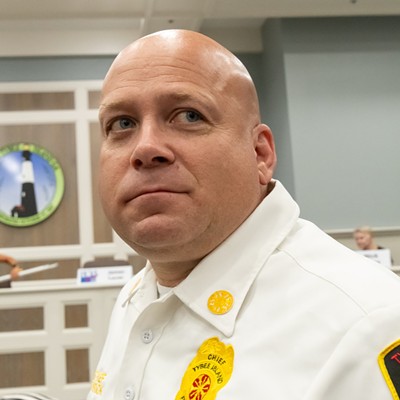JOE BUCK is making a bid for the office he’s already held, from 2007-2014.
“I would have kept on except for term limits,” Buck frankly admits.
“But I will say I’ve really enjoyed being out of office,” he laughs.
Overall, Buck has spent virtually his entire adult life in education, including a 40-year career at Armstrong, now a part of Georgia Southern.
“I feel I still have something to offer. It’s been harder in some ways this time around, but at least the second time you know what you’re getting into,” he says.
While in office, Buck was perceived as an ally of then-Superintendent Thomas Lockamy, who entered a very public spat with current Board President Jolene Byrne almost from the moment she took office.
Buck says it didn’t have to be that way.
“I think different leadership styles result in different kinds of teams,” he says.
“In this particular case I thought we had run a really good board. When you look at the board as presently constituted, with the exception of Jolene Byrne and Michael Johnson, I worked with every one for several years, and we didn’t have the problems that you see now,” he says.
You could say that Buck’s agenda is that he has no agenda – specifically, at least.
“I ran the first time without a lot of agenda. And this time I really don’t have a personal agenda. I don’t have a resume to build anymore,” he laughs.
“My primary purpose in office as board president would be to work well with the superintendent so she can do her job. Ideally the board will work as a strong, supportive financial resource, giving operations power to her,” Buck says, referring to current Superintendent Ann Levett.
“Of course we need to get the failing schools off the list. We need to continue to effectively manage ESPLOST. And in today’s world you have to talk about safety,” he says.
“But my agenda will primarily be trying to work with the superintendent so she can also be successful.”
As for Buck’s frequent alignment with Lockamy, he explains, “One reason we worked well together is that I knew Dr. Lockamy liked the spotlight, and I don’t particularly care for it. I let him be in front, and the superintendent should be in front.”
However, Buck says he’s puzzled by how Lockamy kept up his feud with Byrne even as he was entering retirement, helping see to it that the school board was investigated by an accreditation agency.
“I have to say I was hurt by that,” admits Buck. “I would have preferred that he just left. I was surprised at the obvious amount of frustration. I don’t know why he felt that had to be necessary.”
The next Board President enters a somewhat paradoxical situation: The district itself faces tens of millions of dollars in shortfalls, even as Gov. Nathan Deal touts the full funding of the state’s Quality Basic Education formula for the first time in over a decade.
Buck says he’ll believe it when he sees it.
“In my 40 years at Armstrong I never saw the formula fully funded at the higher education level. Then I went into elective office with K-12, and also never saw the formula funded at the level the legislature said it must be by law,” he says.
“Not only did they not fund at the level the law said it had to be funded — they made us give back every year. They called them austerity cuts. Then of course the other part is they mandate that districts do certain things that cost more money,” Buck says.
“So when I hear governor say QBE is fully funded — I’ll have to wait and see.”
Buck says he’d only support a millage rate increase as a last resort.
“If you have to raise taxes, you have to raise taxes. But as I’ve said continuously it’s the last thing you do,” he says.
“I’m not real big on the whole idea when people say, ‘We need another several million dollars, it’s just another mill increase.’ I don’t look at it like that at all,” Buck says.
“I’m for any number of things that would put me in a category of believing in less government, but also more effectively spending the money we do have. I’d say right now we’re not doing either of those things,” he says.
Buck says he’d consider calling for a personnel audit of administrative positions.
“As an educator when times are good, administrative spots really flourish. I’d think right now after a pretty good year of taxes coming in and the economy booming, I would assume there’s probably a heck of a lot more administrative slots than there were in 2010,” he says.
“My way of approaching that would be to request a personnel audit to see how many spots have been added in administration, and how many of them do we actually need,” says Buck.
“Ninety percent of the budget in K-12 is personnel, across the board. Obviously, the basic function is in the classroom. So when you say that, you also have to ask if you really need all the people to fill the offices at 208 Bull Street,” he says.
Buck says he will continue supporting public charter schools, sometimes a thorn in the side of school bureaucracy.
“I’m a huge supporter of charters. But I don’t think, as many people in Atlanta currently do, that charters are the sole answer. They’re one option. I don’t think every school should be a charter school,” he says.
“Lockamy was not a big supporter of charters. We really had to bring him along. But we have some really good charter schools in the district,” Buck says.
“Charters aren’t going away. But they need better funding. A well-run charter is what education is supposed to be all about,” Buck says.
“They run most effectively if they’ve got a good parent board. The ones that have had real problems here have had problems because of the board getting too far in the weeds,” he qualifies.
As to the oft-stated sentiment about charters: Why don’t we just replicate their success at every school? Buck says:
“The key to replicating that across the district is parental involvement — that’s why it works.”





























